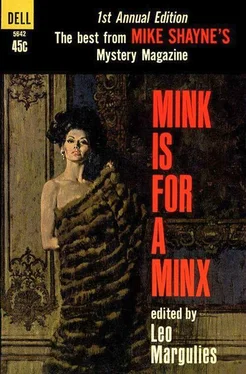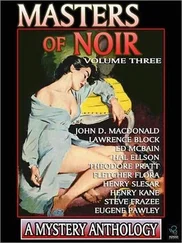Death of a Dead Man
by Brett Halliday
Michael Shayne jammed on the brakes of his car, his eyes glinting with sudden anger. In the dark summer night the other car was slanted across the highway in his path at the center of the small drawbridge. Shayne got out of his car and strode toward the stalled vehicle.
The car was a four-year-old black sedan. For a moment Shayne thought there was no one in it. Then he stepped closer and saw a figure slumped over the wheel. The car was jammed against the guard rail of the small bridge. Apparently the driver had passed out for some reason, perhaps a heart attack, and the car had slewed across the bridge and been stopped by the guard rail.
The car’s engine was still running, giving it even more the look of a tragic accident. But it was not an accident. It was a trap. Shayne, becoming careless, reached through the conveniently open car window to raise the head of the slumped man. The man came to life and gripped the detective’s arm.
A second figure appeared from the shadows of the drawbridge. Shayne had a glimpse of a thin, dark-haired man with a mustache. With his arm held fast Shayne could not pull free in time to defend himself.
The second man hit him on the back of the head. The blow was the work of an expert. Shayne slumped to the roadway of the bridge.
Shayne was stunned but not quite knocked out. That and the fact that the two men were in a hurry saved his life.
The other man had gotten out of the car, and Shayne had a confused recollection of seeing both men move to the edge of the bridge and back again before they slipped their hands under his armpits, lifted his big frame clear of the road, half-carried, half-dragged him to the edge of the bridge, and threw him over. The exertion wrenched a grunt from one of them.
Shayne hit the water hard. He went under. He went down and down until his feet sank into mud. For a second or two he lay unmoving on the bottom. Then, revived by the water but still groggy, he kicked free of the mud and swam upwards, fighting against the tug of the current. His lungs seemed on fire and he was afraid for a moment that he would never make it.
He came up gasping and choking. It was pitch dark. Vaguely, he saw far-off lights that could have been the bridge in the distance. In the narrow channel of Great South Bay the tide was coming in fast. He had been carried half a mile.
Painfully, he struck out for shore. He seemed to swim weakly for hours. At last his feet touched a slippery rock and the loose gravel of a sloping beach. He fell three times before he reached solid ground and collapsed. For a long moment he lay stretched out flat on his stomach, barely breathing.
Lucy Hamilton told Mike Shayne over the intercom at nine-ten that morning that Alistair Finch was on the long distance phone — calling from Westhampton, Long Island. Shayne’s pert, brown-eyed secretary sounded awed. She knew Shayne had known Alistair Finch a long time, and that they were old friends, although they had not seen each other for many years. But the name of the industrialist still awed Lucy.
“He sounds very nervous, Michael,” Lucy said over the intercom.
“Finch is always nervous,” Shayne said. “It goes with all that money and success.”
“That wouldn’t make me nervous,” Lucy said.
Shayne laughed. “Okay, Angel, put him on,” he said, and reached for the desk phone and uncradled the receiver.
The industrialist’s voice was tense with anxiety. “Mike? Thank God I got you. Can you fly up right away?”
“Whoa, Ally, one thing at a time. Fly where? Remember, I’m a Miami detective!” Shayne said.
There was a sound like a deep breath at the other end of the telephone. “Sorry, Mike. I’m at the Westhampton house, the beach cabana. I have guests.”
Shayne saw a mental picture of Alistair Finch’s “beach cabana.” He had been a house guest there once ten years ago. The “cabana” was three stories high, had thirty-two rooms, and looked like a Newport mansion covered with ivy — which, in fact, it was. Its only claim to being a beach house was its location — on a slight elevation overlooking the water.
Finch had spent a sizeable sum just on a sunporch extension.
“Tell me the story,” Shayne said.
“There isn’t any story, Mike,” Finch’s voice said. “Just a pretty gruesome fact. I found a body in my garden. The police say he was murdered.”
“How do they figure that?” Shayne asked.
“He had been stabbed three times in the back.”
“I’d be inclined to agree with the police,” Shayne said. “Who did it?”
Finch sighed far away. “I don’t know. I’ve got police all over the grounds. You’ve got to help me, Mike. I know we’ve been out of touch for a good many years. But when this happened, I thought of you at once.”
“I’ll bet you did,” Shayne said drily. “Who is the man — a guest?”
“No, Mike. No one here has the least idea who he is, except—” Finch’s voice hesitated.
“Do the police suspect you?” Shayne asked, abruptly.
“No,” Finch said. “Mike, the man is a total stranger. He doesn’t have any identification papers on him. No one knows who he is—”
Shayne was more acutely aware of the hesitation this time. “Except who?”
“Except me, Mike. But no one knows that I’ve ever set eyes on him before. At least, no one in this country.”
“Who is he?”
Finch was very nervous now. “A man I knew in Italy, Mike — during the war. He was a Partisan leader in a unit I worked with.”
“How did he get to your beach house?”
“I don’t know that either,” Finch said. “The last time I saw Pietro Corelli was in Italy in nineteen forty-four. That was nineteen years ago.”
“You had no idea he was in this country?” Shayne asked.
This time there was a very deep breath on the other end of the line. “Mike, I didn’t even know he was alive.”
“You mean you hadn’t heard from him — or anything at all about him — in nineteen years? That’s not so unusual is it, Ally?”
“Mike,” Finch said, “Pietro Corelli was killed by the Germans in nineteen forty-four.”
Shayne let a long count of ten pass through his mind. Finch seemed to be doing the same thing on the other end of the telephone. Then Finch spoke again.
“I saw them take him,” Finch said, “so did two of my men. He was shot two days later. There’s no doubt at all in my mind he’s been dead for nineteen years.”
“Until a few days ago,” Shayne said.
“Mike, I can’t take anything like this. You know how important my business is and the kind of company I run. Mostly Government work. I’ll pay you well, Mike.”
Shayne considered his work calendar. He could hire people to cover two routine jobs. One major job he could let go for a few days.
“I’m on my way, Ally,” he said.
Shayne took the first jet north after arranging for his work to be covered. Before he left he asked Miami Police Chief Will Gentry to give him a letter of introduction to the New York Police. Shayne had met New York State Police Lieutenant Edwin “Ed” Masters ten years ago in Westhampton, but Will Gentry was in a position to help him secure further cooperation from the New York authorities.
He also stopped off at Tim Rourke’s office to see if he could get a file on Alistair Finch. Fortunately the man was of sufficient national importance to be of reference-file interest to a good many newspapers.
Shayne read the material on Finch on the jet north. He knew Finch, but it had been many years, and he wanted up-to-date details. Finch was president and owner of a large chemical company. He had inherited the company and his money. What Finch had not inherited was a special chemical additive for rocket fuel. The chemical was vital, and Finch had grown much richer since the war.
Читать дальше



